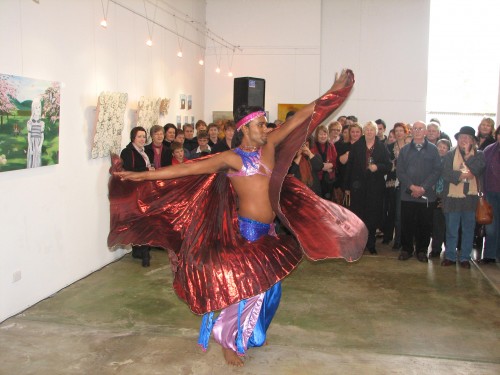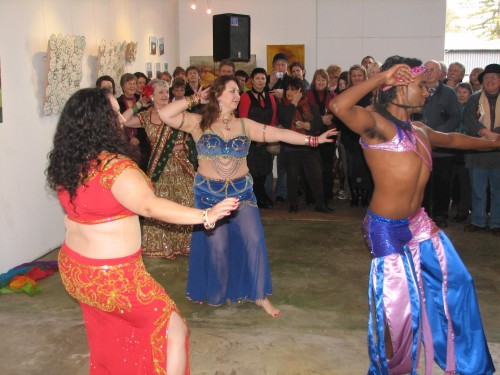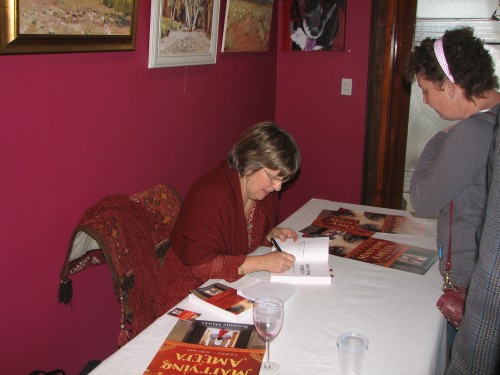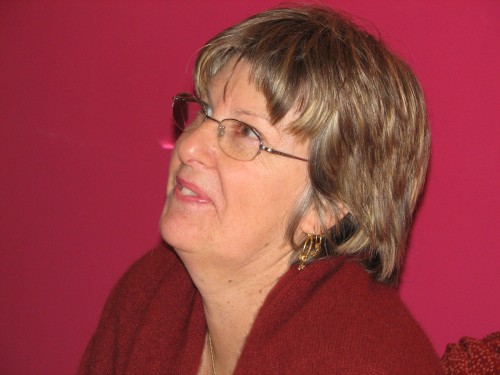Review: Searching for the Secret River

Cover - Searching for the secret river
I have recently read Kate Grenville‘s historical novel The Secret River. You can read my review here.
Straight after finishing the novel I went on to read her follow up book Searching for the Secret River.
In this second book she goes into great detail about how she researched the novel. The story is based upon the life of her great-great-great grandfather, but she took the facts gleaned from family history and extensive research both in London and in Sydney over a five year period and transformed it into fiction. She has used fact as a broad brush in the hands of her imagination and the finished novel is brilliant. It gives the reader a much clearer view of life in the early years of settlement in the young Australian colony.
Searching for the Secret River is a fascinating expose on the thinking processes of one of our leading authors. Grenville takes us on a journey from the first inklings of an idea for a book through to the finished product. At first she was planning a non fiction book but she struck so many obstacles along the way that she changed tack completely, fictionalising it and letting her imagination run. I’m pleased she did.
While she does address some of the issues faced by all writers of fiction, this is not a handbook on writing. Sure, she does explain why she changed from first to third person, but generally it was the research that so intrigued her that she recounts in the first part of the book. Throughout she grapples with her attitudes, and those of the settlers, towards the Aboriginal people who would have lived in the Sydney area during the time in which she sets her novel. She was confronted by some very unsavoury discoveries. The reader of the novel is likewise confronted by some of the events of those days. Australian history is not always the clean, lovely accounts I read as a student many years ago.
While she has drawn from actual historical records, her novel is not another version of history. ‘I was shameless in rifling through research for anything I could use,’ she writes, ‘wrenching it out of its place and adapting it for my own purposes… What I was writing wasn’t real, but it was as true as I could make it.‘ (Grenville p. 210) She has been criticised for her (alleged) misuse of history. I think she has achieved what most other writers struggle with – she has made history come alive for the reader.
Reference:
- Grenville, K, 2007, Searching for the Secret River. WF Howes, Leicester.
Book review: The Secret River by Kate Grenville

The Secret River
I’ve recently read Kate Grenville‘s novel The Secret River on the recommendation of a friend. I can’t recall if I’ve ever read any other works by this prominent Australian author, but will certainly be looking at her other books in the future.
The story begins in London and follows the story of William Thornhill, a boatman on the Thames. He is involved in a misadventure which lands him in jail and sentenced to hang. Fortunately his wife’s family has connections, and his sentence is commuted to transportation to Australia as a convict ‘for the term of his natural life.’ His wife and young family are allowed to travel on the same convict ship, but as free settlers in the new penal colony at Sydney.
The story grabs the reader as Thornhill and his family struggle to survive. After some years he gains his freedom. Through hard work and many setbacks they eventually establish a farm they think of as their own. The indigenous population see things much differently and the inevitable conflict arises. This is a dark and often tragic part of recent Australian history, the ramifications of which we are still attempting to work through.
Grenville has drawn some memorable characters, especially in Thornhill, his wife Sal and her longing to some day return home to London, and some of the minor characters living near them. Their daily endeavours are well documented, set against the ever present strangeness of the unfamiliar landscape. Grenville also carefully plots the growing problem they had with the local Darug people who had lived here at one with the environment for millennia.
Interestingly, this story was inspired by the author’s family history. Her great-great-great grandfather was Solomon Wiseman after whom Wisemans Ferry, near modern Sydney, is named. While the novel is fiction, the author has drawn heavily upon historical records of the day, including those of her family. Thus we have in the novel a blurring of the line between historical fact and an author’s imagination as expressed in the fiction of the story.
This blurring resonates with what I am attempting to do with my own work in progress, a children’s novel set in Nepal which draws on actual historical events.
The Secret River is an important work by a highly acclaimed Australian author. It has rightly won many awards, including:
- Winner, Commonwealth Writers’ Prize 2006
- Winner, NSW Premier’s Literary award 2006
- Shortlisted, Man Booker Prize, 2006.
Reference:
Grenville, K 2005. The Secret River. Text, Melbourne.
Another book launch

Last Sunday my wife and I attended the second launch of Rosanne Hawke’s latest novel Marrying Ameera. This time the launch was in Rosanne’s home town of Kapunda in the lower north of South Australia. I wrote a review of this wonderful book here.
The launch was held in one of the local art galleries and the highlight of the afternoon for the crowd of over 200 family and friends was a 45 minute performance by Bollywood style dancer Reshman and four belly dancers. Another personal highlight was when one of the belly dancers invited me to join her! I’ve never done that before!
After the launch Rosanne was kept busy signing copies of her novel for admiring family and friends.
Author website:
- Rosanne Hawke: read more about Rosanne and her books on her web site.
Book Review: Marrying Ameera by Rosanne Hawke
Released just this week, Marrying Ameera is the latest YA novel from award winning South Australian author Rosanne Hawke.
Whatever you read this year, put this novel on your MUST READ list.
Ameera, 17 years old, is the daughter of an Australian mother – a Christian – and a Pakistani father who is a devout Muslim. Seeking to be like her Australian friends, Ameera discovers that her father strongly and actively opposes any social contact with non-Muslims. He tightens his grip on her activities until he discovers her interest in a Pakistani Christian boy.
She is suddenly sent off to visit relatives in Pakistan thinking she is attending the wedding of her cousin Jamila. Soon after she arrives she discovers the awful truth: it is she who is marrying her wealthy cousin through a business transaction organised by her own father.
When her passport, return ticket and mobile phone are confiscated by her uncle, Ameera realises she is trapped. There seems no way out of going through with the wedding. Only her determination, courage and a growing love for Tariq can see her through this nightmare.
This is without doubt the best novel I’ve read this year, and the best YA novel in a long time. The author has drawn a wide range of believable and very memorable characters, all of them true to their particular culture, either Australian or Pakistani. I found the conflict experienced by the characters caught between two cultures as portrayed in Ameera, for example, to be both compelling and authentic.
Rosanne Hawke has used to great advantage the time she lived in Pakistan while teaching, and later on a fellowship while researching this novel. Her understanding of the Pakistani culture brings this story to life as she describes the customs, foods, clothing, ceremonies and even the elaborate jewellery used in weddings.
While this is a story which carries the reader along – a page turner – it also has a very serious message. The people living in countries like Pakistan still practice arranged marriages, and have done for centuries. This story is different. It portrays a forced marriage which is now illegal in Pakistan. Sadly, many forced marriages, in a range of countries, still occur. Few girls caught in such a situation don’t have the means to escape, or have the courage of the character Ameera to face the consequences of their plight.
This novel is a love story.
A tragic love story with just a touch of romance, romance shattered by reality. I believe, however, it is not a novel just for girls. Sure, it will appear to be most attractive to teenage girls, and they won’t be disappointed.
If I had my way however, I’d make this compulsory reading for every teenage male in Australia. There is so much they could learn about love, respect, honour and relationships. Besides – it’s an exciting read with danger abounding on every page.
References:
- Hawke, R, 2010, Marrying Ameera, Harper Collins, Sydney.
- Rosanne Hawke – click to go to her website.
- Reading guide to Marrying Ameera
Update: this book sold out in the first week after publication. It is about to go to a second print run. Fantastic.
Book Review: “Treasure Hunters” by Allan Baillie


Treasure Hunters
A few weeks ago I finished reading the novel for teenagers called Treasure Hunters written by Australian author Allan Baillie. What an entertaining read it proved to be.
I’d read some of Allan’s books before but I forget which ones. On checking his website I found out how truly prolific his writing career has been. His list of published books is indeed daunting. The list of prizes and awards he has won for his books is truly amazing. Reading his autobiographical notes on his web site is also amazing. He has led a life that can only be described as full-on adventure – including once being arrested on the suspicion of spying!
Treasure Hunters is best described as a thriller. Sure, there is adventure there too, but the narrative carries the reader on up to the exciting climax. Masterful storytelling indeed.
The main character Pat joins his father on a quest to find the world’s richest shipwreck off the coast of an Indonesian island riddled with political and social turmoil. The dangers of diving to great depths adds yet another layer of danger and Baillie casts an exciting net over the action.
I’m not into diving and have very little knowledge in the field, but Baillie weaves in enough information along the way to help even the most ignorant reader understand what is happening, and the dangers faced by the characters.
It is a thrilling read and highly recommended.
It is also worth reading the author’s autobiographical notes on his web page here.
References:
- Baillie, A 2002, Treasure hunters. Camberwell, Victoria, Penguin Australia.
- Allan Baillie web-page, accessed 26th June 2010.



